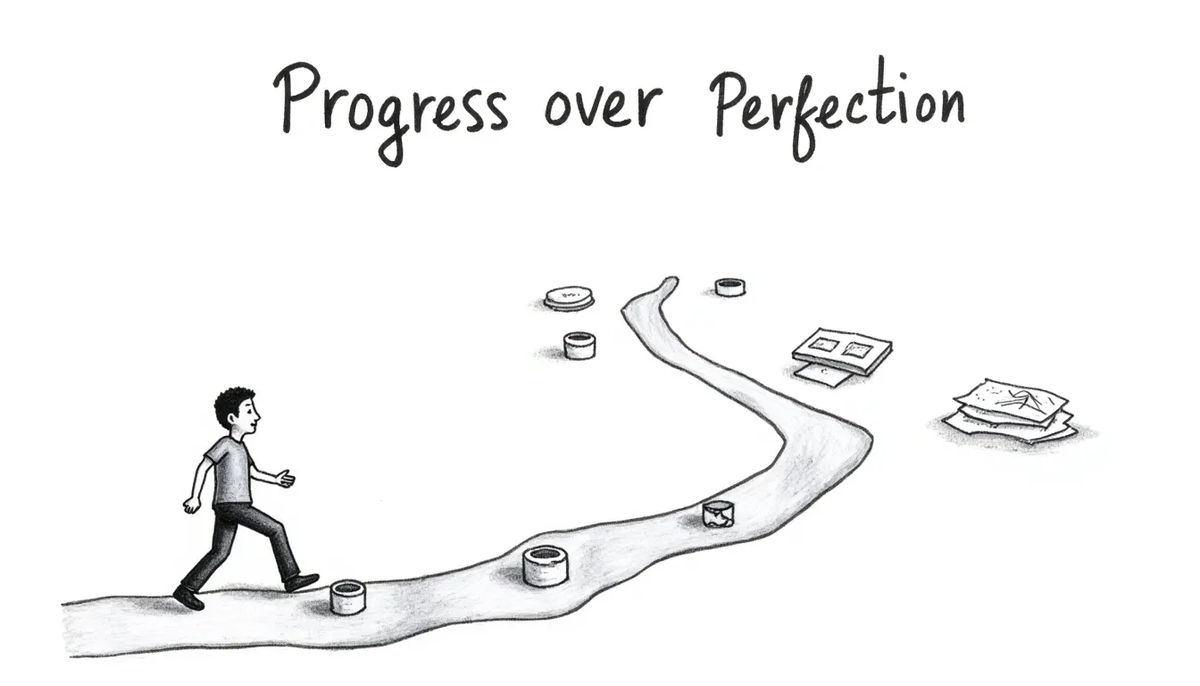Overcoming Perfectionism: How to Break Free from the Enemy of Progress
Discover how perfectionism hinders progress and learn practical strategies to overcome the fear of imperfection, boost productivity, and achieve your goals without getting stuck in the pursuit of flawlessness

The Perfectionist's Paradox: When Striving for Better Holds You Back. How to Stop Procrastinating and Start Achieving.
Introduction
Improvement, while generally positive, is sometimes counterproductive. Sometimes, improvement is the enemy of progress, and can delay success, or even lead to failure.
This is especially true when reaching the point where improvements lead to diminishing returns.
It's well known that striving for perfection is an antipattern. The problem is that it's not always obvious that you are falling into this trap.
Perfect is the enemy of good — Voltaire
The truth is that it's much easier to keep iterating to "perfection" instead of facing those underlying issues head-on. It's a coping mechanism, a way to avoid dealing with the real source of the problem. Luckily, it's avoidable, if you pay attention to the signs and if are honest with yourself.
Let me listen to this
I have used NotebookLM to generate a podcast version of this article. You can find it here:
Perfectionism is the Symptom of a Disease
Perfectionism is the symptom of a disease. I'm not kidding.
So-called "perfectionists" will spend hours tweaking small details, never feeling satisfied with the end result. In reality, perfectionism is often a symptom of deeper insecurities or anxieties. Fears.
Perfectionism is the illusion that all details matter equally — Tiago Forte
The truth is that it's much easier to keep iterating to "perfection" instead of facing those underlying issues head-on. It's a coping mechanism, a way to avoid dealing with the real source of the problem. Luckily, it's avoidable, if you pay attention to the signs and if are honest with yourself.
Signs that Perfectionism is Holding you Back
Perfectionism can manifest in various ways, often subtle enough to go unnoticed until they significantly impact your productivity, life, and success. Common signs include chronic procrastination, as the fear of imperfection leads to task avoidance. You may find yourself unable to complete any important project or task because you set (consciously or not) unrealistically high standards. This leads to disappointment, frustration, and in severe cases, burnout. The inability to celebrate achievements, no matter how significant, is another telltale sign, as you might tend to focus on what could have been better, instead of appreciating what has been accomplished. Recognizing these signs is the first step towards breaking free from this "illness".
I have had such tendencies for decades now. And I know exactly where it came from: insecurities, low self-esteem, and Impostor syndrome. Those have developed through constant criticism I received from my dad when I was a teenager, and because I was extremely shy. In a way, this pushed me forward in life. It forced me to try and remain "perfect" in the eyes of everyone. I had a visceral fear of being judged, even though there was not much to be afraid of. I needed to stay "invisible" in a way, and the only way I could achieve that was by doing everything as perfectly as I could, always remaining "in control", no matter how hard and exhausting it was. No wonder I came so close to a severe burnout. More recently, through my startup project failure, I've also realized how damaging it had become for me. That's also why I'm writing this today; to share my own experience of this illness.
Here are some signs that you are falling into the trap of perfectionism:
- You have trouble completing tasks (duh)
- You keep finding ways to improve or tweak things
- You are obsessing over details for days
- You never feel satisfied about the end result
- You have trouble accepting something as "good enough"
- You procrastinate frequently
- You regularly switch between tasks
- You wait for the "perfect" timing or conditions to get started
- You are stuck in Analysis paralysis, trying to make the "best" choice
- You're overly critical of yourself and others
- You set impossibly high standards
- You fear taking the wrong decision or making the wrong move
- You keep pushing yourself beyond reasonable limits
- You feel stressed or burned out
- You never allow yourself to relax
- You don't celebrate your progress and achievements
- You think in terms of absolutes. Either something is perfect, or it is a total failure
- You have trouble seeing shades of gray and partial successes
- You know you have already missed opportunities by delaying delivery
- You have hit a point of diminishing return. You know that each further improvement will yield less and less benefit
- You are constantly comparing yourself to others
Perfectionism is when the subscouscious overvalues the unimportant subtasks in order to postpone task completion and hence the verification of our performance
This can lead to a cycle where we feel overwhelmed by seemingly endless smaller tasks, never reaching a point where we can truly assess our accomplishments and move forward with confidence.
Nobody is a "real" Perfectionist
Nobody is a perfectionist. We like telling ourselves and others that we are but deep down, it's just fear masquerading in fancy clothes. Perfectionism is a shield we use to protect ourselves from criticism, failure, success, and the uncomfortable reality that nothing is perfect. When we act like perfectionists, we're just avoiding the real and meaningful work. The work that we're "scared" about
Yes, you might get criticized. Yes, you might fail. Yes, you might actually succeed. But you won't know unless you stop iterating, and start delivering. Your best work is the work that others can see and/or benefit from, not the one you're endlessly iterating over.
Shipping is crucial for learning
Many people, myself included, miss many opportunities because they are scared to tackle the work they're actually afraid of. Don't be one of those. You need to learn to say "stop", and accept that "this will do". You need to accept that "this is good enough". More often than not, better can come later.
Progress is a better measure than perfection. It shows that we are learning, growing, and striving to be better versions of ourselves. Strive for excellence, not for an unattainable ideal.
Perfectionism keeps us from making mistakes but also from making progress — Tiago Forte
Learn to ship. Face the criticism if it comes, and be ready to improve based on actual feedback, rather than based on your fears. Shipping is crucial. Actual progress can only come from actually releasing your product, service, or work. Many projects never see the light of day because creators are constantly tweaking and improving without ever launching. Again, I'm writing this based on my own experience. I worked for two whole years (an insane amount of life time) on a startup project that nobody will ever use. That project die because we mistakenly pursued the illusion of perfection.

Learn to embrace imperfection
Embrace imperfection. Accept that your first iteration may not be perfect. Consider each piece of work as a starting point. Unless if you create rockets for the NASA, your first "version" doesn't have to be perfect. Just look at SpaceX. How many rockets did they fail to launch? Did it stop them? No. Yes, it could have, but it didn't.
One thing is for sure. If they kept delaying their launches, their company would be long gone by now. Instead of trying to design the perfect thing before launching it, they pushed the button, watched it explode, and learned from their mistakes.
Normalize imperfection. The best things in life are rough around the edges
Seek feedback, not perfection
Real-world feedback is invaluable. You can't predict how people will react. Whether it's your customers, your boss, your colleagues, your partner, etc. Seek feedback instead of perfection.
While quality is of course important, there's often a point of diminishing returns where further improvements delay release without meaningful benefits.
Anytime you resist perfection and share your work, no matter the feedback, you advance in some way. You either receive praise (win) or criticism you can learn from (also a win). Either way improvement is inevitable. Don't let perfection paralyze you into anonymity — Tiago Forte
Mark the task as "Done". Tell others it's done. Hit "publish". Share your work. Don't add needless delays. Delays just push the feedback further down the road, and actually prevent you from making progress. Get your work out there. Do it now.
Overcome your fear of criticism. Put your ego aside for a minute. Consider that feedback is invaluable. It's necessary for progress, growth, and success.
The great thing about feedback is that it enables iterating based on reality, instead of made-up stories.
How to avoid Perfectionism
Here are a few actionable strategies to help you break free from the perfectionism trap:
Be mindful:
- Stay in the present moment
- Be aware of perfectionist thoughts and tendencies as they arise
Reframe your thinking:
- Recognize that perfection is often subjective/unattainable, and develop a "good enough" mindset
- Be willing to try new things without fear of failure
- Focus on effort and progress rather than flawless outcomes. Instead of "This must be perfect," try "This is the best I can do right now"
- View challenges as opportunities to learn and improve. Replace "What if I fail?" with "What can I learn from this?"
- Shift from "I should have done better" to "I did my best with what I knew at the time, and with the resources I had available"
Set realistic goals and expectations:
- Break big projects into smaller, manageable tasks
- Set time limits for tasks to avoid endless tweaking
- Define what "good enough" looks like for each task
- Focus on progress, not perfection
Prioritize and focus:
- Identify the most important/urgent tasks
- Allocate your time and energy accordingly
- Let go of less critical details
Challenge your assumptions:
- Question whether your high standards are truly necessary
- Consider if others have the same expectations you do
- Evaluate if perfectionism is actually helping or hindering your goals
Take action despite doubts:
- Start before you feel fully ready or prepared
- Focus on taking the first step, however small
- Use the "2-minute rule" to overcome procrastination
- Remind yourself that done is better than perfect
Set boundaries:
- Learn to say no to unnecessary tasks or commitments, so that you can focus your energy
- Recognize when you're overextending yourself
Seek feedback and outside perspectives:
- Ask others for input to gain new insights
- Be open to constructive criticism
- Don't take feedback personally. Use it as a tool for growth
- Remember that others are often less critical than we are of ourselves
Practice self-compassion (i.e., love yourself)
- Recognize that mistakes and imperfections are normal and human
- Talk to yourself kindly, as you would a friend
- Celebrate small wins and incremental improvements
- Let go of self-criticism and self-induced negativity
Learn from others:
- Study how successful people in your field handle imperfection
- Observe how others balance quality with efficiency
- Seek mentors who can provide perspective and guidance
You should also consider Journaling and Periodic reviews. Those are both extremely valuable, and can help you look more objectively at your own plans and actions. That being said, if you are honest with yourself, you usually know when you are busy splitting hairs.


Over time, you might have developed severe perfectionist tendencies, but it doesn't mean you can't act differently in the future. Try these strategies for yourself, and you should find a healthier balance, without getting stuck in an endless cycle of tweaking and second-guessing. Focus on continuous improvement.
Continuous improvement is better than delayed perfection — Mark Twain
Conclusion
Next time you find yourself caught in the perfectionist trap, remember this:
Your enemy isn't mediocrity, it's inaction
Ultimately, the key is to find the right balance between improvement and action. Continuous improvement is valuable, but not at the expense of progress. Learn to recognize when better becomes the enemy of good, and you'll be more effective in achieving your goals.
Remember that the goal is not perfection, but rather creating value and solving problems. Sometimes, done is better than perfect. Recognizing when you've reached "good enough" is a crucial skill for both professional and personal projects.
So go ahead. Take that first step, share that imperfect draft, launch that minimum viable product. The path to excellence is paved with many iterations, not a single flawless attempt.
If you'd like to discuss this concept further or have any specific questions about it, I'd be happy to explore that. Let me know if you need any clarification or additional information!
Finally, I'll leave you with this wonderful quote:
Pobody's nerfect — Pam, The Office, Season 8
References
- How self-esteem leads to perfectionism
- https://theskillcollective.com/blog/low-self-esteem-perfectionism
- https://counseling.umd.edu/resources/students/perfectionismlow-self-esteem
- Perfectionism is about seeking external validation to compensate for volatile self-worth: https://www.reddit.com/r/perfectionism/comments/181l3we/perfectionism_is_not_about_being_perfect_its/?rdt=60847
- Re-evaluating the importance of perfectionism: https://www.cci.health.wa.gov.au/-/media/CCI/Consumer-Modules/Perfectionism-in-Perspective/Perfectionism-in-Perspective—08—Re-evaluating-the-importance-of-achieving.pdf
- Relationship between perfectionism and self-esteem: https://www.sciencedirect.com/science/article/pii/S1877042811020702
- How perfectionism can harm your self-esteem: https://www.betterhelp.com/advice/general/how-perfectionism-can-harm-your-self-esteem
- The impact of perfectionism on self-worth
- https://mywholeheartedtherapy.com/resources/f/the-sneaky-nature-of-perfectionism-and-its-impact-on-self-worth?blogcategory=Separation
- https://www.lmu.de/en/newsroom/news-overview/news/when-success-dictates-self-worth.html
- The high cost of perfectionism: https://www.linkedin.com/pulse/high-cost-perfectionism-grace-mathenge/
About Sébastien
I'm Sébastien Dubois, and I'm on a mission to help knowledge workers escape information overload. After 20+ years in IT and seeing too many brilliant minds drowning in digital chaos, I've decided to help people build systems that actually work. Through the Knowii Community, my courses, products & services and my Website, I share practical and battle-tested systems. You can follow me on X 🐦 and on BlueSky 🦋.
I am an author, founder, and coach. I write books and articles about Knowledge Work, Personal Knowledge Management, Note-taking, Lifelong Learning, Personal Organization, and Zen Productivity. I also craft lovely digital products.
If you want to follow my work, then become a member and join our community.
Ready to get to the next level?
If you're tired of information overwhelm and ready to build a reliable knowledge system:
- 🎯 Join Knowii and get access to my complete knowledge transformation system
- 📚 Take the Course and Master Knowledge Management
- 🚀 Start with a Rock-solid System: the Obsidian Starter Kit
- 🦉 Get Personal Coaching: Work with me 1-on-1
- 🛒 Check out my other products and services. These will give you a rock-solid starting point for your note-taking and Knowledge Management efforts







